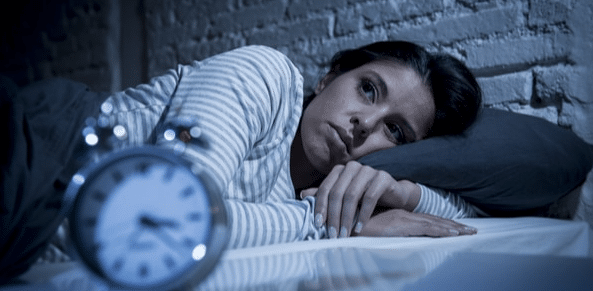Having trouble sleeping lately? Whether it involves difficulty falling asleep, staying asleep, and/or feeling restless the next day, it is no wonder that with the ongoing pandemic, there has been a surge of troubled sleepers worldwide. Some experts are even coining the term “coronasomnia” for the increased COVID-19-related sleep issues, creating a vicious “insomnia-causes-stress-causes-more-insomnia cycle” (UC Davis Health, 2020).
A recent report from the National Institutes of Health (NIH; Morin & Carrier, 2020) emphasized a study that revealed increased rates of clinically significant insomnia along with more acute stress, anxiety and depression in response to the pandemic (Lin et al., 2020). There is sufficient evidence demonstrating how a lack of sleep can have a range of negative health impacts, ranging from depression to an increased risk for heart conditions. Of concern, is that these sleep disturbances may become chronic and endure well after the pandemic. Thus, the individuals who develop sleep disturbances during COVID-19 may be at greater risk for long-term adverse health outcomes, exemplifying the “call for concerted public health interventions” (Morin & Carrier, 2020). Correspondingly, the European CBT-I Academy Task Force has compiled some practical recommendations available to the public to help individuals manage sleep disturbances during the pandemic (Altena et al., 2020), you may find that article here.
What is CBT for Insomnia (CBT-I)?
If you feel that your insomnia is getting out of control and you are having difficulty sleeping lasting for weeks, you may benefit from Cognitive Behavioral Treatment for Insomnia (CBT-I). CBT-I was developed and tested by Dr. Gregg Jacobs at Harvard Medical School and the University of Massachusetts Memorial Medical Center (Jacobs, 2020). This treatment is a structured, evidence-based program which aims to help individuals relearn how to sleep. The program is brief (i.e., six weeks), which includes an initial evaluation followed by five sessions with a CBT-I certified provider. Furthermore, CBT-I is covered by most insurance companies.
During the CBT-I sessions, individuals are taught:
- how to change sleep thoughts and behaviors.
- lifestyle habits that improve sleep
- relaxation skills
Moreover, CBT-I has been endorsed by the NIH, New England Journal of Medicine, the Lancet, American Psychological Association (APA), Consumer Reports, and the American College of Physicians as an effective and preferred method for treating chronic insomnia (Jacobs, 2020).
How Effective is CBT-I?
Research on CBT-I (Jacobs, Benson, & Friedman, 1996; Jacobs, Pace-Schott, Stickgold, & Otto, 2004; Morin, 2004; Morin et al., 1999, 2004, 2006; Wu, Bao, Zhang, Deng, & Long, 2006; Wu, Appleman, Salazar, & Ong, 2015) shows that:
- 75% of insomnia patients experience significantly improved sleep
- 85- 90% reduce or eliminate sleeping pills
- CBT is more effective than sleeping pills
Find a CBT-I Therapist
If you are interested in learning more about CBT-I, please feel free to contact PNBC for additional information.
Written by Angela J. Patino, Psy.D. Dr. Patino is a bilingual clinical and forensic psychologist and CBT-I certified provider at PNBC. She is currently offering CBT-I telehealth sessions with select clients.
References:
Altena, E., et al. (2020). Dealing with sleep problems during home confinement due to the COVID-19 outbreak: Practical recommendations from a task force of the European CBT-I Academy. Journal of Sleep Research. doi: 10.1111/jsr.13052.
Jacobs, G. (2020). CBT-I Treatment. Retrieved from https://www.cbtforinsomnia.com/cbt-i-treatment/
Jacobs, G., Benson, H., & Friedman, R. (1996). Perceived benefits in a behavioral medicine insomnia program: A clinical report. American Journal of Medicine, 100, 212-216.
Jacobs, G., Pace-Schott, E., Stickgold, R., & Otto, M. (2004). Cognitive behavioral therapy and pharmacotherapy for insomnia: A randomized controlled trial and direct comparison. Archives of Internal Medicine, 164, 1888-1896.
Lin, L., et al. (2020). The immediate impact of the 2019 novel coronavirus (COVID-19) outbreak on subjective sleep status. Sleep Medicine, S1389-9457(20)30221-5. doi: 10.1016/j.sleep.2020.05.018
Morin, C. (2004). Cognitive-behavioral approaches to the treatment of insomnia. Journal of Clinical Psychiatry, 65(16), 33-40.
Morin, C., Bastien, C., Guay, B., Radouco-Thomas, M., Leblanc, J., & Vallieres, A. (2004). Randomized clinical trial of supervised tapering and cognitive behavior therapy to facilitate benzodiazepine discontinuation in older adults with chronic insomnia. American Journal of Psychiatry, 161, 332-342.
Morin, C., Bootzin, R., Buysse, D., Edinger, J., Espie, C., & Lichstein, K. (2006). Psychological and behavioral treatment of insomnia: Update of the recent evidence (1998-2004). Sleep, 29(11), 1398-1414. doi: 10.1093/sleep/29.11.1398
Morin, C. & Carrier, J. (2020). The acute effects of the COVID-19 pandemic on insomnia and psychological symptoms. Sleep Medicine. doi: 10.1016/j.sleep.2020.06.005
Morin, C., Hauri, P., Espie, C., Spieldman, A., Buysse, D., & Bootzin, R. (1999). Nonpharmacologic treatment of chronic insomnia: An American Academy of Sleep Medicine review. Sleep, 22(8), 1134-1156. doi: 0.1093/sleep/22.8.1134
UC Davis Health. (2020). COVID-19 is wrecking our sleep with coronasomnia – tips to fight back. Retrieved from https://health.ucdavis.edu/health-news/newsroom/covid-19-is-wrecking-our-sleep-with-coronasomnia–tips-to-fight-back-/2020/09
Wu, J., Appleman, E., Salazar, R., & Ong, J. (2015). Cognitive behavioral therapy for insomnia comorbid with psychiatric and medical conditions: A meta-analysis. JAMA Internal Medicine, 175(9), 1461-1472. doi: 10.1001/jamainternmed.2015.3006
Wu, R., Bao, J., Zhang, C., Deng, J., & Long, C. (2006). Comparison of sleep condition and sleep-related psychological activity after cognitive-behavior and pharmacological therapy for chronic insomnia. Psychotherapy and Psychosomatics, 75, 220-228.

